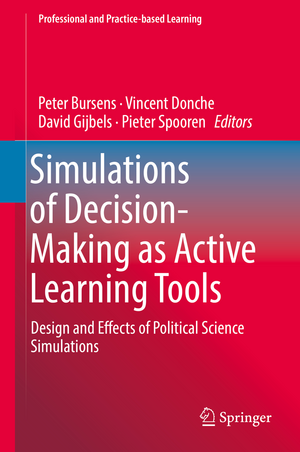Simulations of Decision-Making as Active Learning Tools: Design and Effects of Political Science Simulations: Professional and Practice-based Learning, cartea 22
Editat de Peter Bursens, Vincent Donche, David Gijbels, Pieter Spoorenen Limba Engleză Hardback – 15 mar 2018
| Toate formatele și edițiile | Preț | Express |
|---|---|---|
| Paperback (1) | 383.93 lei 6-8 săpt. | |
| Springer International Publishing – 11 feb 2019 | 383.93 lei 6-8 săpt. | |
| Hardback (1) | 391.22 lei 6-8 săpt. | |
| Springer International Publishing – 15 mar 2018 | 391.22 lei 6-8 săpt. |
Din seria Professional and Practice-based Learning
- 18%
 Preț: 887.24 lei
Preț: 887.24 lei - 18%
 Preț: 891.48 lei
Preț: 891.48 lei - 18%
 Preț: 950.52 lei
Preț: 950.52 lei - 18%
 Preț: 950.03 lei
Preț: 950.03 lei - 18%
 Preț: 1112.30 lei
Preț: 1112.30 lei - 24%
 Preț: 835.99 lei
Preț: 835.99 lei - 15%
 Preț: 641.85 lei
Preț: 641.85 lei -
 Preț: 394.87 lei
Preț: 394.87 lei - 15%
 Preț: 651.19 lei
Preț: 651.19 lei -
 Preț: 394.51 lei
Preț: 394.51 lei - 18%
 Preț: 1240.30 lei
Preț: 1240.30 lei - 15%
 Preț: 651.84 lei
Preț: 651.84 lei - 15%
 Preț: 649.39 lei
Preț: 649.39 lei - 15%
 Preț: 700.75 lei
Preț: 700.75 lei - 18%
 Preț: 733.96 lei
Preț: 733.96 lei - 15%
 Preț: 648.89 lei
Preț: 648.89 lei - 18%
 Preț: 943.57 lei
Preț: 943.57 lei - 18%
 Preț: 1014.89 lei
Preț: 1014.89 lei - 18%
 Preț: 784.61 lei
Preț: 784.61 lei - 15%
 Preț: 647.08 lei
Preț: 647.08 lei - 15%
 Preț: 700.29 lei
Preț: 700.29 lei - 15%
 Preț: 652.64 lei
Preț: 652.64 lei - 18%
 Preț: 886.62 lei
Preț: 886.62 lei - 15%
 Preț: 637.28 lei
Preț: 637.28 lei - 18%
 Preț: 946.41 lei
Preț: 946.41 lei - 18%
 Preț: 939.33 lei
Preț: 939.33 lei - 24%
 Preț: 864.86 lei
Preț: 864.86 lei - 18%
 Preț: 960.78 lei
Preț: 960.78 lei - 15%
 Preț: 635.31 lei
Preț: 635.31 lei
Preț: 391.22 lei
Nou
Puncte Express: 587
Preț estimativ în valută:
74.87€ • 77.24$ • 63.37£
74.87€ • 77.24$ • 63.37£
Carte tipărită la comandă
Livrare economică 04-18 martie
Preluare comenzi: 021 569.72.76
Specificații
ISBN-13: 9783319741468
ISBN-10: 3319741462
Pagini: 230
Ilustrații: XIII, 206 p. 19 illus.
Dimensiuni: 155 x 235 mm
Greutate: 0.49 kg
Ediția:1st ed. 2018
Editura: Springer International Publishing
Colecția Springer
Seria Professional and Practice-based Learning
Locul publicării:Cham, Switzerland
ISBN-10: 3319741462
Pagini: 230
Ilustrații: XIII, 206 p. 19 illus.
Dimensiuni: 155 x 235 mm
Greutate: 0.49 kg
Ediția:1st ed. 2018
Editura: Springer International Publishing
Colecția Springer
Seria Professional and Practice-based Learning
Locul publicării:Cham, Switzerland
Cuprins
Chapter 1 Preface: Simulations of decision-making in political science education, Pieter Spooren, Dorothy Duchatelet, Peter Bursens, David Gijbels & Vincent Donche.- Chapter 2 Introduction Part 1: Design and assessment of simulations, Peter Bursens, David Gijbels, Vincent Donche & Pieter Spooren.- Chapter 3 The costs and benefits of organizing a multi-institutional simulation on the European Union, Andreas Sobisch, John Scherpereel, Peter Loedel, Gretchen Van Dyke & Nick Clark.- Chapter 4 Do simulations enhance decision making in the EU Financial Services? John T. Ryan.- Chapter 5 What’s the EU? Achieving learning outcomes and preparing U.S. students for EuroSim, Rebecca Jones.- Chapter 6 Mission impossible? Verisimilitude in EU simulations, Pierpaolo Settembri & Marco Brunazzo.- Chapter 7 "Will it blend?" Combining online and on-site elements in simulation games, Simon Raiser, Björn Warkalla, Annegret Schneider & Konstantin Kaiser.- Chapter 8 Oranges and Apples? Using Comparative Judgement for reliable briefing paper assessment in simulation games, Pierpaolo Settembri, Roos Van Gasse, Liesje Coertjens & Sven De Maeyer.- Chapter 9 Assessment Strategies in Simulation Games, Simon Usherwood.- Chapter 10 Introduction Part 2: Investigating student learning and outcomes in simulation-based learning environments, Vincent Donche, David Gijbels, Pieter Spooren & Peter Bursens.- Chapter 11 Simulating European climate policy negotiations in a teacher training seminar – which effects can Be detected? Sophie Wulk.- Chapter 12 Effects of EU simulation games on secondary school pupils` political motivations, attitudes and knowledge – results of an intervention study, Monika Oberle, Sven Ivens & Johanna Leunig.- Chapter 13 Learning effects of negotiation simulations – evidence from different student cohorts , Morten Kallestrup.- Chapter 14 Simulations are no‘one-for-all’ experience: how participants vary in their development of self-efficacy for negotiating, DorothyDuchatelet.- Chapter 15 Simulations of decision-making in political science education: premises, promises and challenges, David Gijbels, Pieter Spooren, Peter Bursens & Vincent Donche.
Textul de pe ultima copertă
This volume brings together both political and educational scientists. While educational research literature has so far not systematically addressed the tool of simulations of decision-making, political scientists have hardly used insights from research on assessment or on motivation and interest of students. Almost all political science publications on simulations merely discuss how to implement the tool in class and fall short of providing evidence of the effects on student outcomes such as increased interest and performance. Combining the two disciplines is mutually enriching. Political science benefits from state of the art educational science measuring and testing of the claims made by the proponents of simulations, while educational sciences adds the systematic analysis of simulations of decision-making to their list of empirical objects, which also adds insights to the theories on the affective component of student learning. It is the explicit aim of the volume to address how simulating decision-making environments fosters learning. Implications for research and practice regarding student learning are addressed in all chapters.
Caracteristici
First volume combining authors and insights from two disciplines: educational science and political science Focuses on detailed features of design such as preparation of students and assessment of students’ performance Discusses the effects of simulations on students learning outcomes, motivation and interest
